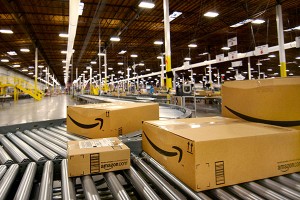Sales Tax Scaries 4: Nexus and Taxability
When Sales Tax Creeps Up on You
Ever notice how the first characters in every horror movie never...

The Amazon FBA (Fulfillment by Amazon) program can be very attractive for small businesses as it streamlines the order processing and logistics of shipping product to customers and even accepting returns.
But before you jump headfirst into this program, you should be prepared for the sales tax (and possibly income tax) implications associated with this program. I can’t comment on the income tax implications but I can regarding sales tax.

If you’ve followed our sales tax blog, you likely recognize that sales tax nexus is the cornerstone to your requirements from a sales tax compliance perspective. Without sales tax nexus, a business has no obligation to the state to collect or remit the applicable sales tax. The burden of remitting use tax on the purchase becomes that of the buyer/consumer.
Some may think that doing business over the Internet does not create sales tax nexus.
And I would agree with that if the business is hosting their own website, their inventory is stored in a single warehouse/garage in their home state, and they deliver via common carrier. (Alternatively, the business may have products drop shipped from a vendor without creating nexus.) Of course, this business would have nexus in their home state due to employees and inventory. But in this example, the business does not have any presence outside their home state. They are free to sell over the Internet and ship their product via common carrier all day long without creating a sales tax obligation.
However, utilizing the Amazon FBA program presents two challenges from a nexus perspective:
Amazon’s website will easily calculate the applicable sales tax based on where the seller identifies they have nexus. However, preparing and filing the monthly returns, staying up to date on where Amazon has nexus, and managing the day-to-day sales tax process can be overwhelming. Seeking expert guidance and possibly outsourcing the sales tax compliance can help the FBA seller sleep better at night.

Ever notice how the first characters in every horror movie never...
Copyright © 2025 TaxConnex, LLC